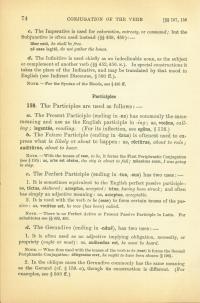158. The Participles are used as follows.
a. The Present Participle (ending in -ns) has commonly the same meaning and use as the English participle in -ing.
vocāns calling
legentēs reading
(For its inflection, see egēns, § 118.)
b. The Future Participle (ending in -ūrus) is oftenest used to express what is likely or about to happen.
rēctūrus about to rule
audītūrus about to hear
Note— With the tenses of esse (to be) it forms the First Periphrastic Conjugation (see § 195).
Urbs est cāsūra. The city is about to fall.
Mānsūrus eram. I was going to stay.
c. The Perfect participle (ending in -tus, -sus) has two uses:
1. It is sometimes equivalent to the English Perfect passive participle.
tēctus sheltered
acceptus accepted
ictus having been struck
It often simply has an adjective meaning.
acceptus acceptable
2. It is used with the verb to be (esse) to form certain tenses of the passive.
Vocātus est. He was (has been) called
Note— There is no Perfect Active or Present Passive Participle in Latin. For substitutes see §§ 492-493.
d. The Gerundive (ending in -ndus), has two uses:
1. It is often used as an adjective implying obligation, necessity, or propriety (ought or must).
Audiendus est. He must be heard.
Note— When thus used with the tenses of the verb to be (esse) it forms the Second Periphrastic Conjugation.
Dēligendus erat. He ought to have been chosen. (§ 196)
2. In the oblique cases the Gerundive commonly has the same meaning as the Gerund (cf. § 159.a), though its construction is different. (For examples, see § 503 ff.)

